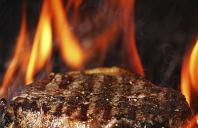Flame-Cooked Burgers
For almost a decade, The Chanler Group’s clients have investigated and initiated actions against retailers and producers of flame-cooked beef found to contain carinogenic polycyclic aromatic hydrocarbons ("PAHs"). PAHs include several different chemicals, including benzo[a]pyrene (“BaP”), one of the most potent PAH chemicals, which is known to the State of California to cause cancer. PAHs can also cause other harm, for instance, exposure to PAHs in the womb during pregnancy is associated with lower IQ, childhood asthma, and childhood anxiety/depression.
The major source of human exposure to PAHs arises from food, especially fatty meats. PAHs form when fatty meats— including beef, pork, fish, and poultry—are cooked at high temperatures. The cooking of the fats in meat at high temperature generates PAHs that then adhere to the meat. When meats are cooked over a flame, the fat melts, drips onto the hot flame or coals, and causes it to flare and partially combust the fat, forming the PAHs that are then deposited back onto the meat. PAHs deposited onto the flame-cooked meat meat wind up in the body when consumers eat burgers or breathe PAH-ladedn smoke.
The Chanler Group’s clients have reached many settlements involving flame-cooked burgers. For example, the key lawsuit Leeman v. Burger King and CKE Restaurants resulted in significant modifications for this industry. In this case, Dr. Whitney Leeman alleged that Burger King and CKE Restaurants sold burgers contaminated with PAHs. As a result of the settlement, Burger King agreed to install new broilers in all of its stores and franchise locations to virtually eliminate PAHs. Burger King also agreed to post warnings within each retail location, until the new broilers were installed, informing California customers of the presence of PAHs.
To review legal agreements that The Chanler Group’s clients have reached with companies that sell flame-cooked meat products, please see the cases below.
firm casework - enforcement

